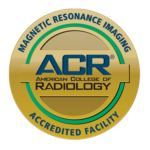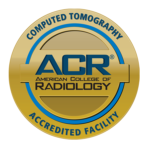COMPUTED TOMOGRAPHY (CT)
Computed Tomography (CT), also sometimes called a CAT scan, is a safe, painless exam that uses x-ray technology to obtain detailed, cross-sectional images of a patient’s body. Generally, CT is the preferred technology for diagnosing cancer, certain infections, traumatic injuries, and other concerns by visualizing tissue and bone—including organs such as the liver, spleen, pancreas, and kidneys—with exceptional clarity.
Intermountain Medical Imaging utilizes state-of-the-art, multi-slice CT technology, enabling our radiologists to capture multiple wafer-thin images of a patient’s body within seconds. This approach gives us the flexibility to customize procedures and perform advanced types of exams, including studies of blood vessels, dynamic imaging of the urinary system and kidneys, detailed imaging of bones/joints, and 3D exams. It also enables us to optimize every aspect of your CT experience, from shorter exam times and greater comfort to superior image quality—ultimately translating into a more accurate diagnosis.
BEFORE ARRIVING FOR YOUR EXAM
Wear loose, comfortable clothing. You may still be asked to change clothing and/or remove jewelry. Items such as belts, bras, hearing aids, dentures, and piercings in the area to be imaged will need to be removed.
Depending on the type of CT study ordered by your referring physician, you may be instructed not to eat or drink anything for four hours before your exam. To find out if any such restrictions are required for your particular CT examination, please contact us or check with your referring physician. It is important to arrive hydrated
Some CT studies use oral contrast, IV contrast, or both to obtain better images. If oral contrast has been ordered, you may be asked to drink a liquid that will highlight your digestive tract. Any oral contrast such as Volumen, or more typically, water, will be given to you at the time of your arrival and registration.
Female patients should notify their physician and our staff before the exam if they are or think they might be pregnant.
DURING YOUR EXAM
Before your procedure, a technologist will ask questions regarding your medical history and history of allergies, including allergic reactions to x-ray dye or contrast. The technologist will explain the procedure, and will also address any concerns you might have in regards to the exam. If IV contrast has been ordered, your technologist or nurse will start an IV.
During your CT scan, you will lie on a table that will pass back and forth underneath a machine shaped like an archway (or an upright donut). A quietly rotating device inside the machine will emit x-rays that pass through the body, capturing thin images of the body that will then be reconstructed by a computer to provide a clear view of the anatomy.
You will be asked to remain still for the short duration of the scan, and for certain scans there will be breathing instructions.
At all times before, during, and after your scan, a CT technologist will be available to explain the procedure and answer any questions you might have.
AFTER YOUR EXAM
Once your exam is complete, there will be no restrictions placed upon you. You may eat, drive, and resume your activities as usual. You may be encouraged to drink fluids to help any contrast material move through the body.
Your images will be examined by a radiologist and their report sent to your healthcare provider within 24-48 hours of your examination. Your healthcare provider will review the results with you.

